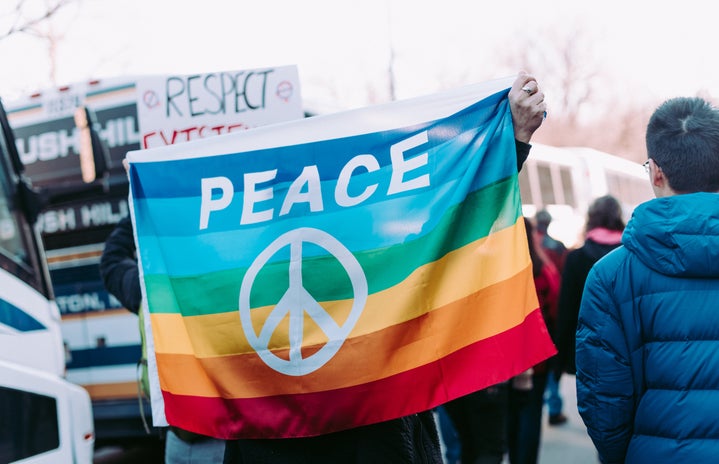Gender Queer is one of the most banned books in America, and I wanted to find out why. Written by Maia Kobabe, a nonbinary author who uses ey/em/eir pronouns, the story is told entirely as a graphic memoir and chronicles Kobabe’s struggles with defining eir gender identity and grappling with questions of sexuality, masturbation, and gender dysphoria.
Needless to say, I loved it.
There’s a common misconception that books told in comic form are only for children, but Gender Queer is a book that could and should be read by people of all ages. Not only does it visually display the struggle that many children face when realizing they don’t fit into gender binaries, but it’s also a searingly honest look into the life of someone who experiences all the hallmarks of growing up in a society that is not conditioned for them.
This book is such an important read for anyone who wants to learn more about gender fluidity or is seeking a story that makes them feel seen and heard. As Kobabe notes toward the end of the comic, when ey is all grown up and pondering the importance of coming out, ey reflects on how “having a nonbinary or trans teacher in junior high would have meant the world to me.”
The same principle applies to books. There are currently 26 active cases preventing Gender Queer from being on shelves in schools. This means there are currently 26 schools lacking crucial information that could be helpful to children in need of representation and validation.
Kobabe takes readers through eir journey of growing up and not wanting to be known as a boy or a girl, feeling relieved when teachers and friends couldn’t tell. Ey talks about getting eir first period and wishing ey couldn’t have breasts. Nothing in these conversations targets people who do wish to fall into these binaries. The emphasis is always on what makes ey uncomfortable.
The problem with most book bans is that they target books addressing LGBTQIA+ topics, often citing claims that the material is sexually charged, with labels venturing so far as to call it pornography. For Gender Queer, “many of the book’s critics seized on a handful of explicit images that illustrate Kobabe’s evolving understanding of gender and sexuality as a teenager and young adult, including a drawing of Kobabe and a girlfriend experimenting with a strap-on sex toy, and another of Kobabe fantasizing about two men having sex,” noted a New York Times article.
I won’t deny that there are some explicit scenes in Gender Queer. Some of them even took me by surprise. But to label the entire book as pornography or unsuitable for children because of a couple of scenes is unreasonable and dangerous. It perpetuates the myth that members of the LGBTQIA+ community are more promiscuous and corruptive. In reality, there’s nothing wrong with coming to terms with your sexuality on your own, and Kobabe’s scenes in the memoir where ey deals with this are done sensitively.
Furthermore, those who wish to censor the story for this kind of material don’t secure any kind of shelter for their children — all they do is harm them. “When you remove those books from the shelf or you challenge them publicly in a community, what you’re saying to any young person who identified with that narrative is, ‘We don’t want your story here’,” Kobabe said in the same article.
If I were a parent, I would rather my child learn about the nuances of sexuality through this memoir than some random corner of the Internet. To ban this book because of the sexual nature of the content is a gross generalization, as the overall message of the story is about acceptance and finding out who you are, even if that means going against the status quo.
Some of the story’s most powerful messages are conveyed in simple prose. “I remembered when I first realized I never have to have children,” said Kobabe in one section. “It was like walking out of a narrow alley into a wide open field. I never have to get married. I never have to date anyone. I don’t even have to care about sex.”
It’s a beautiful and timeless message, something that adults may take for granted as a truism, but especially important for children to hear. How will they know that there’s more than one way to live unless they see this visually represented? Books like Gender Queer introduce other ways of living and shatter the bubble that has been created around heteronormativity as the goal all should strive for.
Another notable section that I loved is when Kobabe is contemplating changing eir pronouns. “Some people are born in the mountains, while others are born by the sea,” Kobabe said. “Some people are happy to live in the place they were born, while others must make a journey to reach the climate in which they can flourish and grow. Between the ocean and the mountains is a wild forest. That is where I want to make my home.”
With just this one passage, Kobabe turns gender conventions on their head and makes it clear to readers that finding your identity is an individual journey. Ey redefines gender as a landscape, something subject to change but always within your control.
It’s easy to see why Gender Queer has been so polarizing. It’s an evocative and life-changing read. People who oppose its presence in schools are resistant to change and afraid that this book does exactly what it intends to do: change minds. While I don’t identify as non-binary, this was an essential read for me, and I would recommend it to anyone who is looking to learn more about the journey so many people within the LGBTQIA+ community undergo.
Goodreads users would appear to agree with me. “Thank you for writing this book because reading it reminded me that I am not alone,” said user Sye. “You saved my life,” said user Sara.
If you would like to learn more about PEN America’s ongoing battle against book censorship, you can click here.
Want to see more HCFSU? Be sure to like us on Facebook and follow us on Instagram, Twitter, TikTok, and Pinterest!


